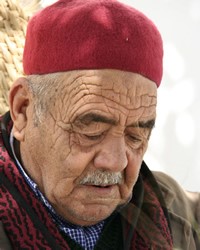Arab, Tunisian in France

Photo Source:
Homayon Zeary - Flickr
Creative Commons
|
Send Joshua Project a map of this people group.
|
| People Name: | Arab, Tunisian |
| Country: | France |
| 10/40 Window: | No |
| Population: | 161,000 |
| World Population: | 11,926,600 |
| Primary Language: | Arabic, Tunisian |
| Primary Religion: | Islam |
| Christian Adherents: | 0.30 % |
| Evangelicals: | 0.10 % |
| Scripture: | New Testament |
| Ministry Resources: | Yes |
| Jesus Film: | Yes |
| Audio Recordings: | Yes |
| People Cluster: | Arab, Maghreb |
| Affinity Bloc: | Arab World |
| Progress Level: |
|
Introduction / History
In the seventh century, Arab invaders overran the Tunisian Berber tribe, Tunisia's original inhabitants. This eventually led to an almost complete Islamization and Arabization of the people of that country. The majority of Tunisian Arabs live in their homeland, Tunisia. They are an Arab-Berber group whose own culture has been greatly influenced by those of Arabs, Berbers, and the French. The Tunisian Arabs in France are distinguished from other Arabs by their ancestry and language, Ifriqi (or Maghribi).
In 1956, Tunisia won its independence from France, and by 1959, Tunisia had successfully begun improving its national education level. However, this success was soon overshadowed by a saturated labor market. As a result, a large number of highly educated Arabs emigrated to Libya and France in search of jobs.
Tunisia maintained a growing economy in the following decades, and by the early 2000s, Tunisia was a relatively prosperous and progressive Arab country. Nonetheless, stability has proven to be a challenge for Tunisia in recent decades, with Islamist government leaders at the helm. Then in 2011-2012, an "Arab Spring" saw thousands of Tunisians flee their country. Many sought better opportunities in Europe. France did not initially welcome the refugees, but today a large number of Tunisian Arabs live in France.
What Are Their Lives Like?
Most Tunisian Arabs living in France are concentrated in Paris. However, there are smaller communities around Lille and up to the Channel Coast. The majority live in large, low-cost urban houses. Such houses are usually only large enough to hold a single nuclear family. This has forced changes in their traditional family life, which revolves around the extended family.
In general, Tunisian Arabs are a friendly people who have a strong sense of family honor. They are quite hospitable to strangers and extremely loyal to family and friends.
Western influences on the Arabs are becoming increasingly more noticeable, especially in Western nations like France. For example, Tunisian Arabs now wear European clothing, or a peculiar mixture of European and Arabian styles. Women are no longer required to keep their faces veiled in public. Their everyday language is a colloquial Arabic dialect, but they commonly speak the French language, especially for business and trade. Some of them speak French as their first language, even at home.
Religious communities in France are allowed to operate their own schools with public funding covering most of their costs. Muslim children tend to be sent to state schools rather than religious schools. This is partly due to the cost of the schools, and because religious schools are less common in the urban areas where Muslims are concentrated. This means that they have little access to religious education. However, most primary schools with a large number of North African students often provide some Arabic instruction as part of their general curriculum.
What Are Their Beliefs?
Virtually all Tunisian Arabs are Sunni Muslim. They adhere to the teachings of the Koran and observe the five "pillars" of Islam which include: affirming that Allah is the only god and that Mohammed is his prophet; praying; giving alms; fasting; and making a pilgrimage to Mecca. However, in France, the mosque has lost its recognition as the most important building among the Tunisian Arab. Most of them now use the communal facilities of their apartment buildings or housing estates as their places of worship. By the 2020s, modernization had made religious duty convenient. The portable "Mosque in a Box" was developed for Muslims who are not able to spend time in traditional mosques. It can be folded up and taken on trips wherever its owner wants to go.
What Are Their Needs?
The Muslims who have grown up in France have experienced its secular system of education. These life experiences are now causing them to question Islam and its culture. Few have the chance to hear that Jesus Christ offers far more than they could ever imagine.
Prayer Points
Pray for spiritual discernment and hunger for truth among Tunisian Arabs in France.
Ask God to strengthen and encourage the small number of Tunisian Arab believers.
Pray that the Lord will give these believers opportunities to share the gospel with their own people.
Ask God to raise up teams of intercessors who will begin to faithfully stand in the gap for the Arabs.
Ask the Lord to raise up a strong church planting movement among Tunisian Arabs.